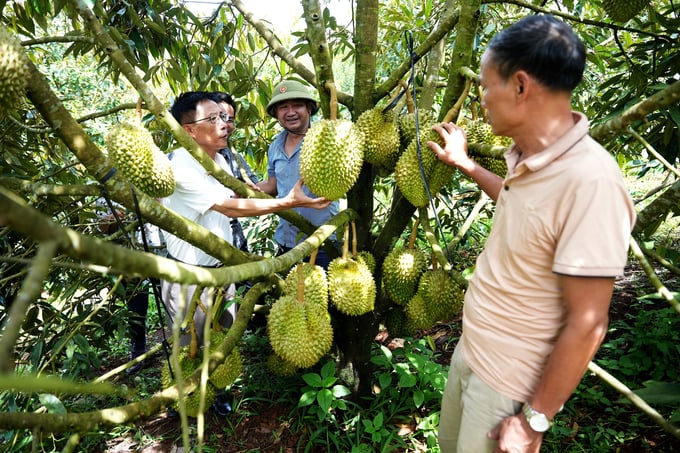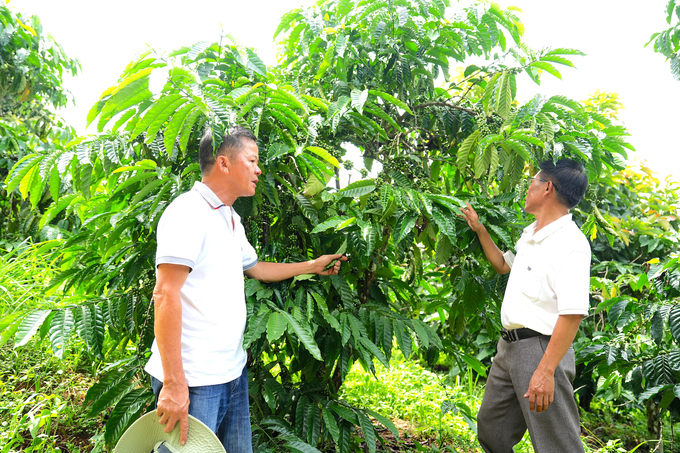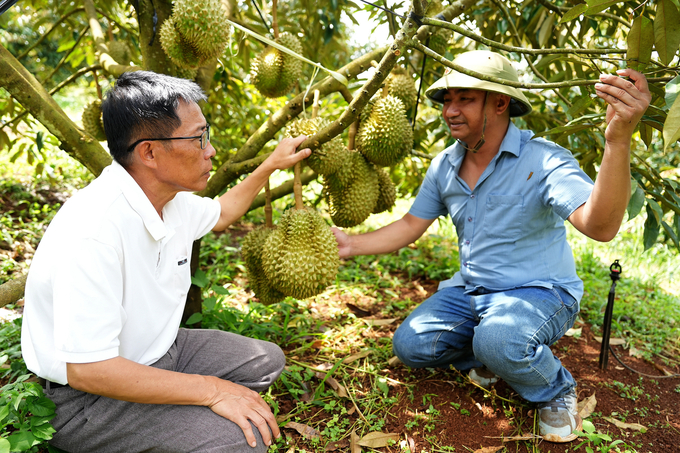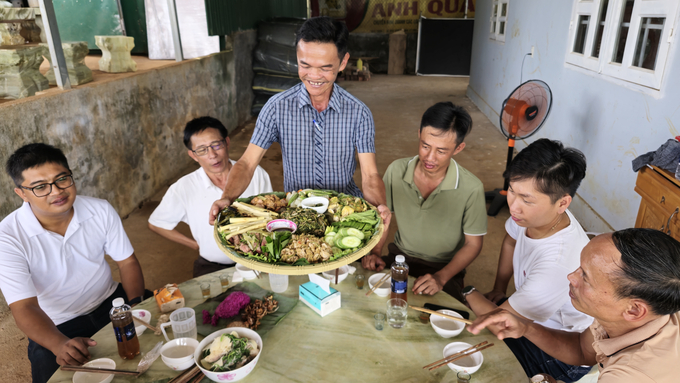June 1, 2025 | 02:51 GMT +7
June 1, 2025 | 02:51 GMT +7
Hotline: 0913.378.918
June 1, 2025 | 02:51 GMT +7
Hotline: 0913.378.918
One such cooperative is the Ta Dung Service - Tourism - Trade Cooperative, located in B'Sre B Hamlet, Dak Som Commune, Dak Glong District, Dak Nong Province. The cooperative was established with the aim of collaborating with households that own fruit gardens, guiding them to adopt clean farming practices, creating experiential destinations for tourists, and contributing to increased incomes for farmers while promoting sustainable agriculture.
What sets this cooperative apart is that its seven founding members all have high educational backgrounds. The Chairman of the Board of Directors, Mr. Pham Ngoc Ha, holds a doctorate in Oriental Medicine, and the other members include journalists, former teachers, lawyers, construction engineers, agricultural engineers, and businesspeople.

Clean durian garden of Mr. Tran Van Du, Dak Som Commune, Dak Glong District. Photo: Hong Thuy.
After two years in operation, the cooperative has partnered with more than 10 durian, mangosteen, coffee, and pepper farms. These farms, though in prime locations with healthy crops, previously followed traditional farming practices, relying on chemical fertilizers and pesticides. The cooperative has acted as a bridge, helping them shift to organic farming methods.
As he showed us some of the farms that have joined the cooperative, Mr. Vo Duy Quang, the Director of the cooperative, shared, "Before founding the cooperative, I spent over five years working in tourism in the Dak Glong area, and it was quite successful. Dak Nong in general, and Dak Glong in particular, have a very favorable climate and fertile soil, ideal for a wide variety of high-value crops such as durian, pepper, avocado, coffee, and mangosteen."
Additionally, Dak Glong is blessed with stunning natural landscapes, such as Ta Dung Lake—often referred to as the "Ha Long Bay of the Central Highlands." It is one of the most captivating destinations for tourists visiting Dak Nong. However, the full potential of this region, particularly in agricultural tourism, has yet to be fully realized.
The cooperative aims to transform local custard apple, durian, and coffee farms into exciting tourist destinations. But to achieve this, the first step is to help farmers shift their mindset from traditional farming to organic practices. We've already seen some early success, with nearly ten farms gradually stabilizing under the new farming methods."

Mr. Nguyen Viet Tien's organically cultivated coffee garden. Photo: Hong Thuy.
At the 2-hectare durian farm owned by Mr. Tran Van Du’s family in Dak Som Commune - one of the fruit farms partnered with the Ta Dung Service - Tourism - Trade Cooperative - the 6-year-old durian trees are laden with fruit, ready for harvest. Mr. Du shared that he has been transitioning from traditional to organic farming for the past two years, following guidance from cooperative members.
“Before, I wasn’t familiar with organic farming; I just followed what others were doing. But after receiving advice from the cooperative members, I gradually learned and adopted their methods. We still use some inorganic fertilizers, but only certified products on the approved list, and we apply them in small amounts at specific stages, such as when the fruit is setting. The yield hasn't decreased, and the fruit is more fragrant and flavorful, though the appearance still isn’t as visually appealing as I’d like,” Mr. Du explained.

Mr. Nguyen Viet Tien's organically cultivated coffee garden. Photo: Hong Thuy.
Next to Mr. Du’s durian garden is Mr. Nguyen Viet Tien’s coffee garden, cultivated according to organic standards after linking with Ta Dung Cooperative and learning farming techniques and processes. Mr. Tien said that his coffee garden is not beautiful, perhaps because he has not spent enough time on it.
Mr. Nguyen Quang Giap, a construction engineer in charge of agriculture and construction of the Cooperative, said that in addition to the advantages of agriculture and landscape, Dak Nong also has a diverse, rich culture, rich in the identity of 40 ethnic groups. Therefore, the potential for developing experiential tourism in the villages, hamlets, and villages of ethnic minorities is not small. “Since our establishment, we have organized dozens of agricultural experiential tours. Visitors are introduced from planting to production and can directly participate in harvesting, processing, and enjoying the products on the spot.
Coffee-related products such as pure coffee beans, roasted and ground coffee, packaged coffee, and other products such as coffee honey, brocade fabric decorated with coffee flowers or coffee bean models will also attract visitors. In addition, the experiences in the bon and ethnic villages are also quite interesting. We organize for guests to interact, light campfires, dance and sing with the people, and enjoy traditional cuisine. All of these tours have received positive feedback from guests after they ended.”

Mr. Vo Duy Quang (standing), Director of Ta Dung Service - Tourism - Trade Cooperative, introduces the traditional cuisine of the M'nong people in Ta Dung.
“In addition to investing in landscape tourism, an important goal of ours is to connect with farmers as in the past, advising them to convert traditional farming methods to clean farming. These will be experiential destinations for tourists. In particular, there will be gardens dedicated to guests who love gardening. On weekends and at the end of the month, they can bring their relatives, family and friends to their gardens to take care of, harvest and enjoy the fruits of their own labor. In addition, visitors can also relax in these gardens while doing their own work,” said Mr. Pham Ngoc Ha, Chairman of the Board of Directors, Ta Dung Service - Tourism - Trade Cooperative.
Translated by Quynh Chi

(VAN) Several scientists and farmers are experimenting with soil treatment in some key durian-growing regions such as Cai Lay (Tien Giang), Dak Song, Gia Nghia, and Dak R’lap (Dak Nong).
/2025/05/25/4127-3-073637_820.jpg)
(VAN) Thanks to the promotion from an FAO-implemented project, vegetable production in greenhouses in Moc Chau has seen strong development, from 1.5 hectares in 2021 to nearly 50 hectares in 2024.

(VAN) FAO has recently supported USD 140,000 to implement the project 'Risk mitigation human-animal interface risks through disease control initiatives in pig farming.'

(VAN) The People's Committee of Tra Vinh province has approved an adjustment to the investment policy for the Green Hydrogen Plant project, increasing its area to approximately 52.76 hectares.
![Reducing emissions from rice fields: [2] Farmers’ commitment to the soil](https://t.ex-cdn.com/nongnghiepmoitruong.vn/608w/files/news/2025/05/05/dsc08881jpg-nongnghiep-140632.jpg)
(VAN) Clean rice cultivation model in Thuong Tan commune, Bac Tan Uyen district, is assisting local residents in achieving sustainable agriculture by substantially reducing costs, increasing productivity, and protecting the environment.

(VAN) At the conference to disseminate Resolution No. 68, AgriS introduced its digital agricultural ecosystem and reaffirmed its commitment to accompanying the Government in promoting private sector development and sustainable agriculture.

(VAN) 'Blue Ocean - Blue Foods' initiative is designed to restore marine ecosystems and establish sustainable livelihoods for local communities by cultivating a minimum of 1,000 hectares of cottonii seaweed in the first three years.